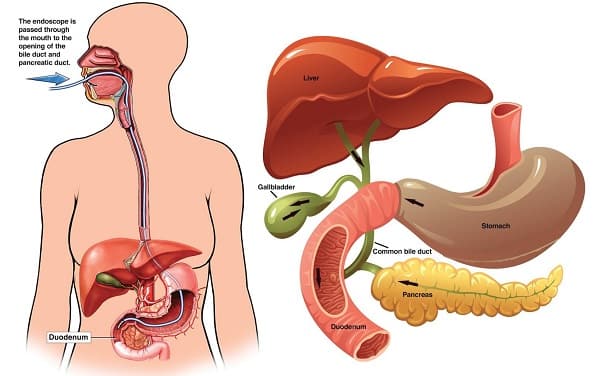Endoscopic Retrograde Cholangiopancreatography or ERCP as it is commonly known is a medical procedure conducted for use of diagnosing and treating abnormalities in the pancreas, bile region, bladder, and liver. It allows the doctor to diagnose the issue that a normal X-ray or MRI scan cannot provide. The procedure uses a flexible endoscope that is passed into the patient’s throat to help view the areas of the body for diagnosis and assess the situation.
This helps in identifying the situation and providing information for the amicable treatment to be conducted further. This can be used in cases of diagnosis, stent placement, stone removal, draining the fluid, and more.
How ERCP Test Works (The Complete Procedure)
As discussed above, this test is used for various purposes like diagnosis, stent placement, stone removal, and draining the fluid. The procedure involves various steps which we’ll discuss here.
The procedure can be performed as part of the hospital stay or without it as per the situation and the suitability of the patient. The patient has to go through mandatory pre-evaluation tests for assessment and preparation. Thereafter the patient is led to the procedure room. The patient needs to change into a surgical gown and will be laid in a bed. They will have the IV line inserted and followed with an oxygen tube into the nose if required. The patient is then provided with a numbing spray after which an endoscope will be passed through the throat to the patient. The patient will also be administered a sedative if required.

The endoscopy tube inserted inside the patient will then be led to the targeted area where multiple X-Rays and imaging will be done. This will provide the details for the assessment of the situation. The doctor may take a sample of tissue or fluid for further biopsy if needed. Once the procedure is done, the endoscopy tube will be removed from the patient and led to rest.
The cost of an ERCP test depends on various factors like:
Note:
ERCP tests are used in conjunction with a lot of other medical procedures to help assess the patient’s condition and identify proper treatment. This helps to cure or treat the issue and help the patient to heal properly.
Q1. What If A Patient Feels Like Vomiting During The Procedure?
Ans: Before the endoscope is inserted through your mouth/throat, the examiner or doctor will use a numbing medication. This medication is sprayed on the back of your throat to numb the area. This way your throat area will be numb for approximately 30 minutes, and during this time, the examiner will pass the endoscope through your mouth to all the way inside your stomach.
Q2. Why The Artificial Dye Is Inserted Into The Bile Duct During The ERCP Test?
Ans: When the examiner locates the bile duct opening using the endoscope, another small and flexible tube is passed through this opening, then the examiner injects a special dye in a very small amount. This dye reflects on the x-ray, and it helps the examiner see blockage of any sort or stones in the bile duct. However, it is completely normal that you may feel some discomfort and nausea when the dye is injected but it doesn’t last long.
Q3. How Long Does The ERCP Test Last?
Ans: The duration of the ERCP test usually depends upon the condition of the patient. However, if it is a basic test where the doctors are just examining the bile duct area, then it wouldn’t last longer than 90 minutes. However, if the examiner is required to take samples for the biopsy, or remove stones from the bile duct, then the ERCP test duration can go as high as 3 hours.
Q4. What Is The Complication Rate With ERCP Tests?
Ans: Complications are pretty rare with ERCP tests, but sometimes problems do occur during and after the test. Usually, patients face problems when the contrast dye is inserted because it may cause some reactions, but it is not that common. Other than that, when the examiner or doctor is removing stones from the bile duct area, this procedure may cause bleeding, and thus patients may feel pain, discomfort, fever, nausea, etc.